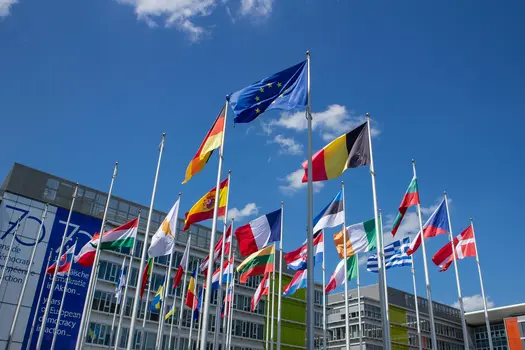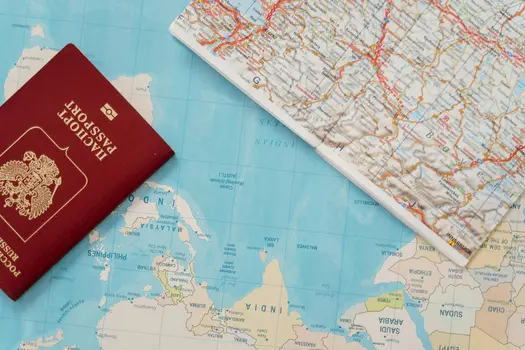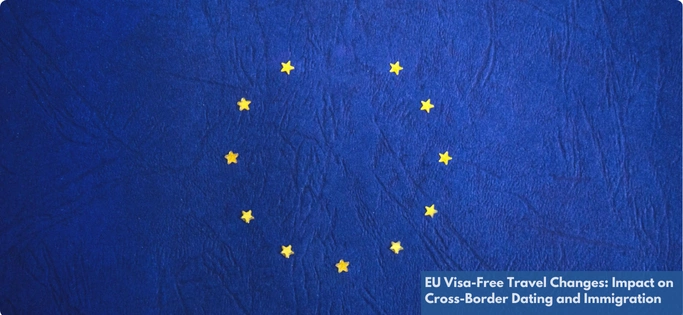The EU Visa-Free Travel change is happening, and sooner too. The European Union is set to implement stricter visa-free travel rules in 2025, potentially affecting 61 countries whose citizens currently enjoy hassle-free access to the Schengen Zone. For international couples in long-distance relationships or planning immigration to be with an EU partner, these changes could significantly impact your future together.
Many cross-border relationships rely on the predictability and ease of visa-free travel for visits, planning meetups, and building a life together. With the EU making it easier to suspend visa exemptions, your relationship logistics might need rethinking sooner than expected.
Understanding these potential changes now, rather than being caught off-guard later, can help you develop contingency plans for your relationship, whether you’re still in the dating phase or already making concrete immigration arrangements. Let’s break down what these changes could mean for your cross-border love story.
Key Takeaways
- EU Visa-Free Travel changes may lead to visa requirements for partner visits
- Plan ahead for longer processing times and fees
- Document your relationship history thoroughly for immigration
- Consider accelerating serious immigration plans if possible
Why the EU Visa-Free Travel Changes Matter for Cross-Border Couples

For couples separated by borders, visa-free travel isn’t just a convenience – it’s often the lifeline of your relationship. When one partner can simply book a flight and visit without paperwork hurdles, spontaneous weekend visits and splitting time between countries become possible. That freedom to connect in person without bureaucratic barriers is precious.
The proposed changes mean that even if you’re from countries like the United States, Canada, or the United Kingdom, your ability to visit your EU partner might suddenly require advance planning, documentation, and fees. For relationships already stretched across time zones, adding visa complications could create another layer of stress.
More importantly, these changes could affect not just visits but long-term immigration plans. If you’ve been building toward eventually moving to your partner’s EU country, shifting visa policies might alter your timeline or eligibility. Will Americans need a visa for Europe in 2025? It’s a question many cross-border couples are now forced to consider.
Understanding the New EU Visa Landscape
Who Could Be Affected by the EU Visa-Free Travel Changes?
The EU’s revised approach targets 61 countries currently enjoying visa-free access to the Schengen Zone. If your relationship spans borders with one of these nations, pay attention:
- North America: United States, Canada, Mexico
- Europe (Non-EU): United Kingdom, Ukraine, Serbia
- Asia-Pacific: Japan, Australia, Singapore
- Latin America: Brazil, Argentina, Chile
- Caribbean: Bahamas, Barbados, Saint Lucia
Your ability to maintain regular visits with your partner might change if the EU invokes the new suspension mechanism against your home country. For visa-free access, Schengen privileges to continue, countries must maintain good standing in several categories that the EU now considers critical.
What’s Triggering These Changes?

The EU’s concerns go beyond simple border control. Several factors are driving this policy shift:
Migration Management Despite decreasing irregular border crossings in early 2025, the EU remains cautious about migration flows. Countries that become sources of irregular migration might face visa suspension, even if that migration isn’t coming from their own citizens.
Security Issues The EU has grown increasingly concerned about what it terms “hybrid threats” – situations where migration becomes weaponized as a political tool. For couples, this means your travel freedoms could be affected by broader geopolitical tensions rather than any personal risk you pose.
Golden Passport Programs If your home country offers citizenship-by-investment programs (often called “golden passports”), your visa-free privileges might be in jeopardy. The EU views these programs as potential security vulnerabilities that could provide backdoor access to the Schengen Zone.
For couples planning to use such programs as part of their immigration strategy, this development deserves particular attention. The citizenship-by-investment EU ban considerations could directly impact your options.
Planning Your Relationship Around New Visa Realities
What Immigrants Need to Know About EU Visa-Free Travel Changes
If you’re in a serious relationship spanning EU borders with potentially affected countries, consider these practical measures:
- Document Your Relationship History. Begin collecting evidence of your relationship’s legitimacy and duration. Save flight confirmations, accommodation bookings, photos, together with timestamps, and communication records. If you eventually need to apply for family reunification or partner visas, this documentation will prove invaluable.
- Research Alternative Visa Pathways. Don’t rely exclusively on visa-free access for your relationship. Familiarize yourselves with other visa categories that might apply to your situation:
- Tourist visas (if visa-free access ends)
- Working holiday visas (for eligible countries)
- Student visas (if considering education in your partner’s country)
- Digital nomad visas (if you can work remotely)
- Consider Timeline Acceleration. If you’ve been contemplating marriage, civil partnership, or other formalized arrangements that might provide immigration benefits, the upcoming policy changes could justify moving your timeline forward. Travel visa requirements for Europe 2025 might be more stringent than today’s rules.
- Create a Financial Buffer. The potential need for visa applications means budgeting for new expenses. Start setting aside funds for:
- Visa application fees
- Translation of documents
- Potential legal consultation
- Travel to the visa application centers
- Medical exams or insurance requirements

Long-Term Strategic Planning
For couples with serious immigration intentions; especially for family visas, these visa policy changes require strategic thinking:
Evaluate Your Eligibility Realistically With stricter regulations possibly on the horizon, assess whether current immigration pathways will remain available to you. The changes might affect not just short visits but long-term residence permits and family reunification processes.
Consider Third-Country Options. If direct immigration to your partner’s EU country becomes challenging, explore whether another EU nation might offer more accessible pathways. Once legal residence is established in any EU country, freedom of movement rights could eventually help reunite you.
Professional Consultation The complexity of these changes and their potential impact on individual situations means that generic advice has limits. Consider consulting with immigration attorneys specializing in EU migration law, particularly those familiar with cross-border relationship cases.
How EU Visa-Free Travel Changes Could Affect Different Countries
For Americans with EU Partners
If you’re wondering, “Will Americans need a visa for Europe in 2025?” well, since the US President Donald Trump has placed tariffs of up to 145% on Chinese goods. and other countries, the answer is nuanced. While the U.S. isn’t likely to be among the first countries targeted for visa suspension, Americans should still monitor these developments closely.
The relationship between the EU and the U.S. remains strong, but political tensions or policy disagreements could affect travel freedoms. Americans planning to move to Europe for love should consider accelerating their plans if possible. Since the United States presidential inauguration, some pressure has been felt across the board.
Recent developments highlighted in Donald Trump news have stirred fresh discussions around immigration policies and international agreements, adding an extra layer of uncertainty that couples should keep in mind when making long-term plans.

For UK Citizens Post-Brexit
Brexit has already complicated matters for British citizens with EU partners. These new visa suspension mechanisms add another layer of uncertainty. The UK’s inclusion on the list of potentially affected countries means British citizens might face additional hurdles when visiting EU partners.
UK citizens’ Schengen visa requirements could change with relatively little notice under the new system. If you’re in a UK-EU relationship, document everything meticulously and stay informed about policy developments.
For Partners from Developing Nations
Citizens from developing countries with EU partners may face particular scrutiny under the new rules. If your home country has:
- Higher rates of visa overstays
- Political instability
- Economic migration patterns
- Citizenship-by-investment programs
Your visa-free privileges might be among the first targeted. Consider formalizing your relationship legally if that provides immigration benefits, as relationship visas may become your most reliable option.
Technology Solutions for Cross-Border Relationships
As visa rules potentially become more complex, leverage technology to maintain your connection during separation periods:
- Visa Tracking Applications Several apps now help track application progress and send alerts about policy changes affecting specific countries. Set up notifications relevant to your situation.
- Document Storage Systems Use secure cloud storage to maintain your relationship evidence and visa documentation, ensuring you can access it from anywhere when needed.
- Virtual Date Planning. If your visa changes, temporarily extend your separation, invest in quality equipment for virtual connections; proper lighting, good microphones, and stable internet can make long-distance communication more intimate.
- Immigration Forums. Join online communities of couples in similar situations. These forums often share early warnings about visa policy changes and practical workarounds.
Preparing for Potential Visa Applications
If your country loses visa-free status, being prepared for visa applications becomes essential:
- Understand Processing Timeframes: Schengen visa applications typically take 15 days but can extend to 45 days in complex cases. Factor these timeframes into any visit planning.
- Financial Requirements: Most visa applications require proof of financial means. Begin documenting your financial stability with bank statements, employment verification, and accommodation arrangements.
- Purpose Documentation: Visiting a romantic partner falls under “visiting friends/family” in most visa categories. Collect invitation letters from your partner and evidence of your relationship.
- Health Insurance Coverage: Most visa applications require travel insurance meeting specific minimum coverage requirements. Research options in advance.
Immigrants dating across borders will also need to rethink their travel and immigration plans as the EU tightens visa-free policies in 2025.
Legal Relationship Recognition Options
For serious couples, obtaining legal recognition of your relationship might provide immigration benefits even if visa-free travel ends:
- Marriage vs. Civil Partnership: Different EU countries have different rules about which relationship formalities provide immigration benefits. Research the specific options in your partner’s country.
- Registered Partnership Recognition: Some countries recognize registered partnerships or civil unions performed elsewhere. Document your relationship status formally, even if not immediately, using it for immigration.
- De Facto Partnership Recognition: Several EU countries recognize unmarried partnerships if you can demonstrate cohabitation or a durable relationship. Keep evidence of your relationship timeline.
- Family Reunification Rights: EU citizens have stronger rights to family reunification than non-EU residents in Europe. If your partner is an EU citizen, understand their specific rights to bring you to their country.
Final Thought About EU Visa-Free Travel Changes
The EU’s planned EU Visa-Free Travel policy changes represent a significant shift that could affect cross-border relationships in numerous ways. By understanding the motivations behind these changes – migration control, security concerns, and citizenship program scrutiny – you can better prepare for potential impacts on your relationship.
Taking proactive steps now, before any actual visa suspensions occur, gives you the best chance of maintaining the connection with your partner regardless of policy changes. Document your relationship thoroughly, research alternative visa pathways, and consider formalizing your relationship if marriage or civil partnership aligns with your plans.
Remember that while these policy changes may complicate your journey, countless couples successfully navigate immigration challenges every year. With proper preparation, clear communication, and perhaps some timeline adjustments, your cross-border relationship can thrive despite changing visa landscapes.
The most important action you can take today is to stay informed about EU visa exemption updates, specifically affecting your country, while simultaneously building your relationship documentation portfolio. Your love story doesn’t need to be derailed by policy changes – it just might need some additional planning.
FAQ EU Visa-Free Travel Changes
Which countries may lose EU visa-free travel? Up to 61 countries could potentially face visa suspension, including the United States, Canada, the United Kingdom, Japan, Australia, Brazil, and Mexico. Countries offering citizenship-by-investment programs or experiencing security or migration issues are at higher risk.
When will these visa changes take effect? The EU plans to implement the revised visa suspension mechanism in 2025. However, individual country suspensions could happen at different times based on specific triggers.
What is the EU visa suspension mechanism? It’s a framework allowing the EU to temporarily suspend visa-free travel privileges for citizens of specific countries if certain conditions are met, such as increased irregular migration, security threats, or issues with citizenship-by-investment programs.
How might these changes affect visits to my EU partner? If your country’s visa-free status is suspended, you would need to apply for a Schengen visa before visiting your partner. This involves documentation, application fees, processing time, and possibly in-person appointments at consulates.
What evidence should I collect about my relationship? Save flight itineraries, accommodation bookings, photographs together with timestamps, communication records, financial transfers between you, and any legal recognition of your relationship, such as registered partnership documents.
Could these changes affect my long-term immigration plans with my partner? Yes. Beyond just visits, changing visa policies might impact pathways to residence permits, settlement permissions, and naturalization timelines. Rules for family reunification could also become stricter.
What are hybrid threats in EU migration policy? Hybrid threats refer to situations where migration is weaponized as a geopolitical tool. The EU cites examples of certain countries allegedly directing migrants toward EU borders to create pressure or destabilization.
How does citizenship-by-investment affect EU travel? Countries offering “golden passport” programs that grant citizenship through investment may face visa suspensions as the EU views these programs as potential security risks, providing backdoor access to the Schengen Area.
Will I need a visa if I’m already married to an EU citizen? Being married to an EU citizen typically provides stronger immigration rights, but specific procedures still apply. You might need a family reunification visa rather than relying on visa-free access.
How can I stay updated about changes affecting my specific country? Monitor official EU Commission announcements, subscribe to alerts from your country’s foreign ministry, follow embassy social media accounts, and consider joining online forums for international couples or expatriates from your country.











jdrxlhstdntklfgsrpdpuzvpmmgpkm
rmnehoystvljlvqiwptepmfsrjjlog
hyqvtkxenlpmqfzwfvmqrrviipprem